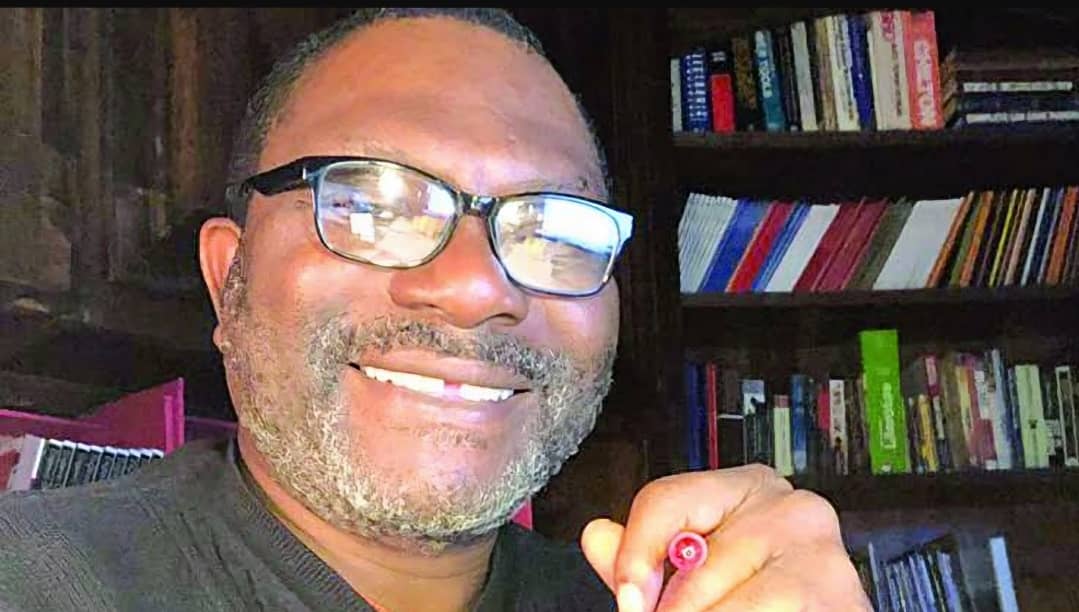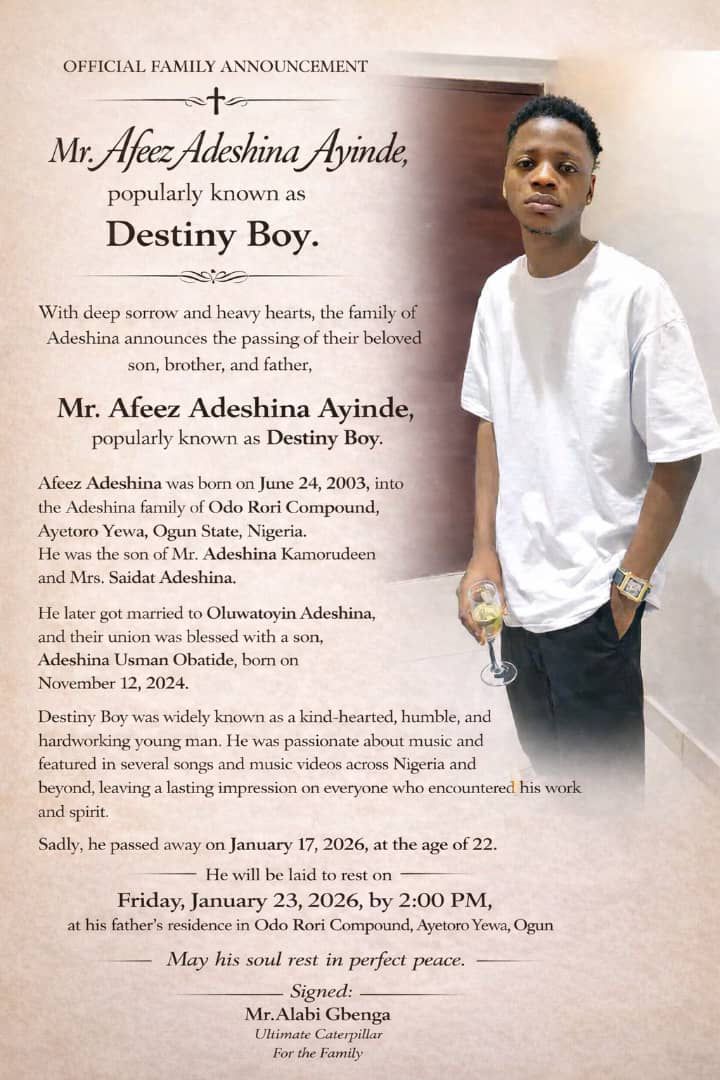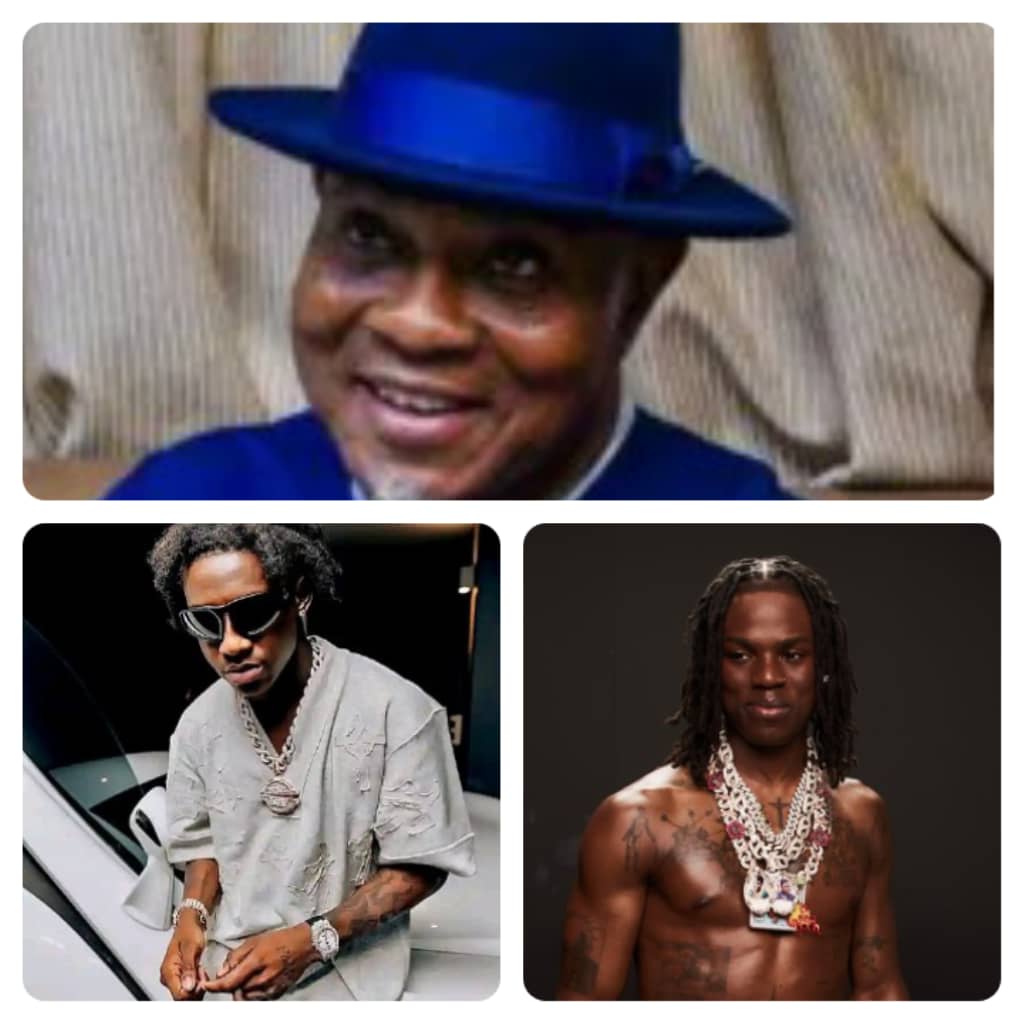Entertainment
Cash “Aye-ko-ooto” Onadele: A Roaring African Voice Calling for Change through the Arts

Cash “Aye-ko-ooto” Onadele: A Roaring African Voice Calling for Change through the Arts
By Bolaji Israel
Sahara Weekly Reports That The arts and their promoters have long served as powerful voices for inspiring and enforcing radical changes across social, political, economic, and cultural landscapes.
Nigeria, and Africa more broadly, has suffered from poor leadership characterised by corruption, nepotism, widespread poverty, stunted development, inequality, loss of identity, erosion of cultural values, and a troubling craving for foreign lifestyles, among other social maladies.
These issues have marred the promising trajectory of a nation with over 200 million people, rich in both natural and human resources, especially since the onset of its current fourth democratic era in 1999.
One of the literary voices leveraging the power of the arts—particularly drama—to inspire change in Nigeria and Africa is Cash Akinyemi Onadele, also known as Aye-ko-Ooto. He is a prolific writer and a culture-aware philosopher, poet, and playwright.
His passion for literature was nurtured by his childhood experiences with his farmer grandparents, who filled his early years with captivating stories. This foundation sparked his interest in literature, and despite earning a Master’s degree in Agronomy, he ultimately found his voice in the realm of the arts.
Onadele firmly believes that the erosion of cultural identity has distorted the mindset of many Nigerians, leading them to embrace foreign influences—revised histories, religions, lifestyles, foods, music, and addictions—instead of the indigenous practices that have proven their worth for centuries before European colonisation.
Through his art, he passionately calls on Africans to return to their roots and heritage as a critical first step towards achieving comprehensive social and economic development. He asserts that a lost mind, devoid of identity, cannot effectively contribute to nation-building.
Despite spending considerable time in Europe and America gaining valuable experience and writing extensively, Onadele has remained true to his African roots, a theme that permeates his impressive body of literary work, which includes over 109 collections of plays, poetry, and prose.
His latest play, “Eni Ogun” (The Noble Warrior), produced with the support of the business sector led by FirstBank, was performed in July across Lagos and Ogun States at iconic venues such as the Muson Centre in Lagos Island and the June 12 Cultural Centre in Abeokuta, in celebration of Prof. Wole Soyinka’s 90th birthday.
Through the play, Aye-ko-ooto not only celebrates Soyinka’s artistic exploits but also tackles critical issues of leadership, identity crisis, culture, values, class, history, and corruption in Nigeria through the lens of history, aligning with Soyinka’s radical ideologies.
The protagonist—a representation of Professor Soyinka—is the young and charismatic Oluwole Lowo, a noble prince and warrior who, despite his preference for a private life of hunting, teaching, and romance with his intended, Olasope, becomes the conscience of society, catalysing a seismic shift in leadership and community dynamics.
Set in the colonial era of 1884/1885, the fictional play delves into themes of colonial invasion and subjugation, love, leadership, cultural beliefs, religion, and corruption.
Onadele weaponises the protagonist’s struggles as a potent catalyst for the community’s collective demand for positive change, ultimately leading to the natives’ triumph over their oppressors.
The over two-hour play, an adaptation from the drama emerges as a clarion call for Nigerians and Africans to unite, shed foreign identities and practices, rediscover true histories and heritage, embrace indigenous customs and cultures, advocate for responsible leadership, and strive for an egalitarian society characterised by development.
In an interview with THECONSCIENCE NG, the playwright unveiled the philosophy underpinning the play: “Every soul has a shell,” inspired by Wole Soyinka’s play, “Death and the King’s Horseman” (1975).
He stated, “I distilled the essence of this quote and wrapped literature around it to explore the persona. The story is rich and layered. My aim was to celebrate a dramatist with a drama. I sought the deeper meaning of the quote, combining romantic comedy with beautiful literature, all interwoven with the story of our people.”
Aye-ko-Ooto elaborated on the underlying philosophy: “Every soul has a birthplace, representing identity; every soul is nurtured, reflecting culture; every soul is loved, embodying passion; and every soul has a noble purpose tied to tribal citizenship. When faced with adversity, every soul must summon the courage of character. Ultimately, every soul carries a message, and that message is your inheritance.
“The essence is clear: if you fail to find your identity, neglect your citizenship, and do not stand up for your values in troubled times, you leave your children without an inheritance.”
Onadele described Wole Soyinka as an enigma—a literary cult hero, cultural icon, champion of freedom, and an unwavering advocate for justice, who also holds a deep affection for children. He shared a personal connection with Soyinka, emphasizing the playwright’s commitment to preserving cultural artifacts as an undeniable ambassador of culture.
To promote the Yoruba language and culture, Aye-ko-Ooto intentionally wrote parts of the play in Yoruba, encouraging European audiences to engage more deeply with the language.
In response to the alarming decline in cultural awareness and identity among young Nigerians, the playwright urged the government to embrace ethnography—a principle that prioritizes narratives rooted in African stories. He advocated for increased funding, including prizes and grants, for works celebrating African culture over those with foreign plots.
He called on well-meaning Nigerians to treat artists and their promoters with respect, rather than viewing them as beggars, while encouraging greater support for the arts based on merit.
Onadele, who also has a background in Artificial Intelligence (AI) from his time in Europe, recalls how being exposed at an early age to the works of renowned Nigerian author of Yorùbá heritage, Chief Daniel Olorunfẹmi Fágúnwa (commonly known as D. O. Fágúnwà), inspired his own interest in writing. For him, the Yoruba native voice adds authenticity to storytelling.
According to Onadele, who has built the world’s largest library of individual poetry produced by any single author, every success story has humble beginnings.
Earlier this year, Aye-ko-Ooto was in his element at the Lagos Book and Art Festival (LABAF), dubbed Africa’s largest cultural picnic, where he conducted a two-day mentorship session with undergraduate students from the Creative Arts Department at the University of Lagos on the first day at Kongi’s Harvest Gallery, Freedom Park, Lagos.
Onadele also hosted another mentorship programme for pupils from various public primary schools.
The prolific writer engaged young people on the value of literature while unveiling an endowment for literary prizes in both Yoruba and English languages. It was a rich, educational, and inspiring experience for participating students, as Onadele shared insights from his journey as a writer, despite having a BSc. and MSc. in Agronomy.
Through Adubiifa Network Company (ANC), a multi-media literary, theatre, and movie company, he employs performance theatre as a means to drive change.
His productions have gained recognition from major players like the Wole Soyinka International Cultural Exchange (WSICE) and the Centre for Black and African Arts and Civilization (CBAAC).
Onadele’s name continues to resonate in the literary space, where calls for major shifts and changes in Nigeria keeps growing louder.
Entertainment
From Drill to Deen: Central Cee’s Conversion and the Power of Faith in Modern Hip-Hop

From Drill to Deen: Central Cee’s Conversion and the Power of Faith in Modern Hip-Hop
By George Omagbemi Sylvester
“The British rap star’s public declaration of Islam sparks global reactions and renews debate about spirituality, identity, and influence in contemporary music.”
British rap superstar Central Cee has publicly announced that he has converted to Islam, a revelation that has rapidly spread across global media and social platforms, drawing reactions from fans, cultural commentators and religious observers alike. The development marks a deeply personal shift for one of the most influential voices in modern UK drill, and it highlights the growing intersection between faith, identity and popular culture.
Central Cee, whose real name is Oakley Neil Caesar-Su, disclosed the decision during a recent livestream, where he stated that he had taken the Shahada, the Islamic declaration of faith that formally marks a person’s conversion to Islam.
According to multiple reports published on February 6, 2026, the rapper confirmed the conversion publicly, saying he had changed his name and embraced Islam, with friends present during the broadcast congratulating him.
The announcement quickly became a trending global topic, with thousands of fans flooding social media with messages of support and congratulation.
What happened, when, where and how
The confirmed facts are straightforward.
What happened: Central Cee announced his conversion to Islam.
Who: The British rapper, born Oakley Neil Caesar-Su.
When: The announcement surfaced publicly on or around February 6, 2026.
Where: The declaration was made during a livestream, widely circulated online.
How: He confirmed he had taken the Shahada and embraced Islam, with friends present during the session.
Before this announcement, Central Cee had never publicly declared adherence to any specific religion, though fans had long speculated about his spiritual leanings.
Background: the rise of a global rap force
Born on June 4, 1998, in London, Central Cee rose from the streets of Shepherd’s Bush to become one of the most commercially successful British rappers of his generation.
He achieved mainstream recognition with his 2020 single Day in the Life and later dominated charts with hits such as Doja and Sprinter, accumulating billions of streams worldwide.
By the mid-2020s, he had become a defining figure in UK drill, blending street narratives with a polished, globally accessible sound.
Reactions and significance
The news of his conversion triggered widespread reaction across continents. Many fans congratulated him, using phrases such as “Welcome to Islam, brother,” reflecting the celebratory tone among supporters.
Others expressed curiosity about whether the decision would influence his music, public image, or future lyrical direction.
Cultural analysts note that religion has long played a quiet but significant role in hip-hop. From Malcolm X’s influence on American rap consciousness to the presence of Muslim artists in both US and UK scenes, faith has often shaped artistic identity.
British sociologist Dr. Reza Pankhurst, writing on religion and youth culture, has argued that for many urban artists, faith offers “a language of discipline, moral structure and belonging in environments often defined by instability.”
Similarly, American scholar Dr. Sherman Jackson has noted that Islam’s appeal among musicians and athletes lies partly in its “emphasis on personal responsibility, spiritual dignity, and community.”
While these are broader observations about religious influence in culture, they help explain why high-profile conversions often resonate far beyond the personal sphere.
Why the announcement matters
Central Cee is not merely another celebrity; he is one of the most commercially powerful voices in British rap, with global reach across Europe, Africa, Asia and North America. His decisions, therefore, carry symbolic weight.
When artists of such stature publicly embrace a faith, it often triggers three parallel conversations:
First, identity: Fans begin to examine how the artist’s beliefs align with their lyrics and public persona.
Second, influence: Younger audiences may view the decision as aspirational or spiritually significant.
Third, authenticity: Critics and supporters alike debate whether faith will reshape the artist’s artistic content.
British cultural commentator Kehinde Andrews has previously observed that hip-hop is “not just music but a social language through which young people negotiate power, race, faith and identity.”
In that sense, Central Cee’s announcement becomes part of a larger cultural dialogue not merely a personal declaration.
The question of a new name
Some reports indicate that the rapper mentioned changing his name after taking the Shahada, though details remain inconsistent across sources.
While certain online reports suggested possible new names, there is no universally confirmed official new name from the artist at the time of reporting.
This remains an evolving aspect of the story, and responsible reporting requires caution until a formal statement is released through verified channels.
The broader context: faith and hip-hop
Central Cee joins a growing list of artists who have publicly embraced Islam. Over the decades, figures such as Yasiin Bey (Mos Def), Lupe Fiasco, Ice Cube, and Q-Tip have either converted to Islam or drawn heavily from Islamic teachings in their music.
In the UK, Muslim identity has long been intertwined with the grime and drill scenes, reflecting the multicultural realities of cities like London, Birmingham and Manchester.
Cultural historian Tricia Rose, one of the foremost scholars of hip-hop, once wrote that the genre “has always been a site of spiritual searching, moral struggle and social commentary.”
In that context, a public conversion is not an anomaly but part of a longstanding tradition of artists seeking meaning beyond fame and commercial success.
What remains unclear
Despite the viral spread of the story, certain details are still evolving:
The exact location of the livestream has not been formally confirmed.
The identity of the individuals present during the Shahada has not been publicly verified.
Any official legal name change has not been documented in confirmed public records.
Responsible journalism requires distinguishing between verified facts and social-media speculation.
Final assessment
Central Cee’s conversion to Islam is a deeply personal decision that has nonetheless sparked global conversation. Announced during a livestream in early February 2026, the declaration places one of Britain’s most influential rappers at the centre of a broader discussion about faith, culture and celebrity influence.
In an era where artists are often defined solely by streaming numbers and chart positions, his announcement underscores a different narrative: the search for meaning, identity, and spiritual grounding in the midst of global fame.
As the late scholar James Cone once wrote, “Spiritual transformation is the most radical form of social change, because it begins inside the human soul.”
Whether Central Cee’s journey will reshape his music or remain a private source of guidance is a question only time can answer. What is certain, however, is that his decision has already stirred conversations that extend far beyond the world of rap.
Entertainment
Remembering Afeez Adeshina “Destiny Boy” : A Life of Promise, Music, And Quiet Impact ~ 1ST ELEVEN9JA TV

Remembering Afeez Adeshina “Destiny Boy” : A Life of Promise, Music, And Quiet Impact ~ 1ST ELEVEN9JA TV
By Alhaji Arems (Baba Fuji)
The Nigerian music scene is mourning the loss of Afeez Adeshina Ayinde, popularly known as Destiny Boy, whose passing has left a deep sense of grief among family, friends, and fans. Though his life was brief, his story is one marked by determination, creativity, and a steady rise driven by passion rather than noise. Destiny Boy passed away on January 17, 2026, at the age of 22, cutting short a journey that many believed was only just beginning.
Early Life And Background :
Afeez Adeshina was born on june 24, 2003, into the Adeshina family of Odo Rori Compound, Ayetoro Yewa, Ogun State, Nigeria. He was the son of Mr. Adeshina Kamorudeen and Mrs. Saidat Adeshina, raised within a close-knit family environment that shaped his values and character.
From an early age, Afeez was known for his calm demeanor and respectful nature. Those who grew up around him often describe him as gentle, focused, and quietly ambitious. Music became an outlet through which he expressed himself, long before public recognition followed. What began as interest and experimentation gradually turned into purpose.
Music Career And Creative Journey :
Known professionally as Destiny Boy, Afeez carved out his place in music through persistence rather than spectacle. He was deeply passionate about his craft and committed to growth, often collaborating and featuring in songs and music videos across Nigeria and beyond.
While he may not have been the loudest voice in the room, Destiny Boy earned respect for his work ethic and humility. He approached music with seriousness, seeing it not just as entertainment but as a path to building something meaningful. Colleagues and collaborators consistently describe him as hardworking, disciplined, and eager to learn — traits that set him apart in an industry often defined by fast success and fleeting attention.
His presence in multiple projects across different platforms reflected a steady upward movement. For many young creatives, Destiny Boy represented the quiet grind: showing up, improving, and letting the work speak.
Family Life And Personal Milestones :
Beyond music, Afeez embraced responsibility early in life. He got married to Oluwatoyin Adeshina, and their union was blessed with a son, Adeshina Usman Obatide, born on November 12, 2024. Becoming a husband and father added new depth to his life, grounding him further and reshaping his priorities.
Those close to him speak of his devotion to family and his desire to build a stable future. Balancing personal life with creative ambition was not always easy, but Afeez carried these responsibilities with maturity well beyond his years.
His Passing :
The news of Destiny Boy’s death on January 17, 2026, came as a shock to many. At just 22 years old, his passing raised a collective sense of loss — not only for what he had achieved, but for the potential that remained unrealized.
While details surrounding his death have been kept private, the impact has been deeply felt across his immediate community and within creative circles. Tributes have highlighted not only his music but his character: kind-hearted, respectful, and sincere.
Burial Arrangements :
The Adeshina family has announced that Afeez Adeshina Ayinde (Destiny Boy) will be laid to rest on:
Friday, January 23, 2026 :
Time : 2:00 PM
Venue : His father’s residence, Odo Rori Compound, Ayetoro Yewa, Ogun State
Family members, friends, colleagues, and well-wishers are expected to gather to pay their final respects and celebrate a life that, though short, left a meaningful imprint.
A Legacy Beyond Numbers :
Destiny Boy’s story is not one measured by chart positions or awards, but by consistency, humility, and quiet influence. He represented a generation of young Nigerian creatives navigating ambition, responsibility, and identity in real time.
In remembering Afeez Adeshina, many will recall a young man who showed up for his craft, valued his family, and treated people with respect. His journey serves as a reminder that impact is not always loud — sometimes, it is built patiently, one step at a time.
As he is laid to rest, his music, memories, and the lives he touched remain.
May his soul rest in perfect peace.
Entertainment
Benin Summit Group Congratulates Rema, Shallipopi for Flying the Benin Flag at AFRIMMA Awards

Benin Summit Group Congratulates Rema, Shallipopi for Flying the Benin Flag at AFRIMMA Awards
The Chairman-in-Council of the Benin Summit Group, Earl Osaro Onaiwu, has congratulated celebrated music stars Rema and Shallipopi for their outstanding achievements at the recently concluded AFRIMMA Awards, where they emerged as shining ambassadors of the Benin Kingdom on the global entertainment stage.
Rema, ( Divine Justice Ikubor) the internationally acclaimed Afrobeats sensation of Benin extraction, carted home three prestigious awards, while fast-rising artiste Shallipopi ( Crown Uzama) also clinched one award, marking a moment of pride not just for Edo State but for the entire Benin Kingdom.
In a statement issued by the Benin Summit Group, Osaro Onaiwu described their victories as a powerful demonstration of Benin excellence, creativity, and global relevance.
“I commend and congratulate Rema and Shallipopi for putting the Benin Kingdom firmly in the global space through their talent, hard work, and discipline. Their achievements are a source of pride to our people and an inspiration to our youths,” Onaiwu said.
He noted that the success of Benin sons in the global entertainment industry reinforces the importance of nurturing creativity and supporting young talents across music, film, fashion, and other creative arts.
“These accomplishments show what is possible when talent meets opportunity and determination. Benin land is rich in creativity, and the world is beginning to take notice,” he added.
Osaro Onaiwu further urged other Benin sons and daughters, particularly those in the creative and entertainment sectors, to remain focused and strive for excellence, emphasizing that global recognition comes through consistency, hard work, and commitment to craft.
“I urge others to strive harder to excel. Let the achievements of Rema and Shallipopi motivate the next generation to dream bigger, work harder, and represent Benin with dignity and pride wherever they find themselves,” he said.
He reaffirmed the commitment of the Benin Summit Group to promoting unity, culture, and development, including the creative arts, which he described as a powerful tool for projecting the Benin heritage and identity to the world.
According to Onaiwu, celebrating the successes of Benin sons and daughters across various fields remains central to the group’s mission of fostering unity, pride, and collective progress within the Benin Kingdom and the diaspora.
-

 celebrity radar - gossips6 months ago
celebrity radar - gossips6 months agoWhy Babangida’s Hilltop Home Became Nigeria’s Political “Mecca”
-

 society6 months ago
society6 months agoPower is a Loan, Not a Possession: The Sacred Duty of Planting People
-

 society5 months ago
society5 months agoReligion: Africa’s Oldest Weapon of Enslavement and the Forgotten Truth
-

 news6 months ago
news6 months agoTHE APPOINTMENT OF WASIU AYINDE BY THE FEDERAL GOVERNMENT AS AN AMBASSADOR SOUNDS EMBARRASSING




